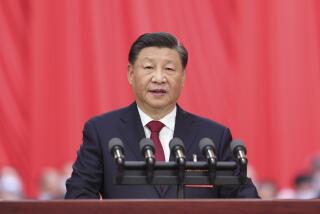China’s New Leap
- Share via
Only with the ideology-shattering economic reforms of the last eight or nine years has the Chinese revolution’s promise of a better life for all begun to produce anything like a tangible reality. Given their first modest taste under communism of a materially better life, 1 billion-plus Chinese have responded as people in every age and culture have always done. They want more. The reformers in the leadership, strengthened by the evidence that under their policies China is better off than at any time since the Communists took power nearly 40 years ago, intend to stay the course. They hope to use the Communist Party congress that began in Beijing this week to assure that there will be no turning back.
This at any rate seems the firm intention of Deng Xiaoping, the architect of China’s shift away from the stifling and destructive policies of the Mao Tse-tung era. Deng can face the gathering of 2,000 of his country’s elite with the satisfaction of a man who has been proved right. He can note that since 1978, when he began to move the country away from the Maoist economic model, grain output has risen by one-third, national output has more than doubled, rural income has tripled and foreign trade has grown sevenfold. These are some of the consequences of China’s experiment with market forces.
Zhao Ziyang, the party’s general secretary and Deng’s protege, has made clear in a remarkable speech to the congress that this experiment is to be expanded, under the imprimatur of a boldly redefined ideology. In essence, Zhao said, whatever succeeds in improving the economy and the life of the people--no matter how greatly it may depart from the dogmas of the past--will be officially blessed. Are market forces seen to work? In that case they are to be considered not as capitalistic but as ideologically neutral. Even “the issuance of stocks and bonds are phenomena which are not peculiar to capitalism.” To the reformers all this is pragmatism. To the enemies of reform it is heresy of the first order.
Those enemies may be subdued for now, but they clearly have not been routed. Economic reforms can’t take place in a political vacuum. Deng and Zhao know, as do their opponents, that further economic progress requires that tightly held controls on decision-making be relaxed. That means spreading authority, not least to managers and technicians who care little about doing things according to communism’s sacred writings. Are the party’s functionaries prepared to give up their monopoly on power? No, but they may still be forced to do so. That at least is what Deng and Zhao intend as they go forward with plans for China’s second communist revolution.
More to Read
Sign up for Essential California
The most important California stories and recommendations in your inbox every morning.
You may occasionally receive promotional content from the Los Angeles Times.













